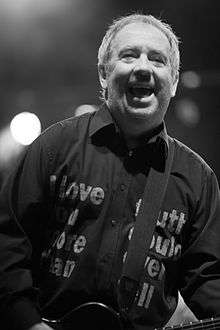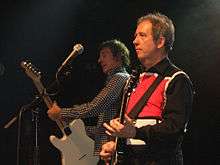Pete Shelley
| Pete Shelley | |
|---|---|
 Shelley in Australia, 2013 | |
| Background information | |
| Birth name | Peter Campbell McNeish |
| Born | 17 April 1955 |
| Origin | Leigh, Lancashire, England |
| Genres | |
| Occupation(s) | Musician, singer, songwriter, guitarist |
| Instruments | Vocals, guitar |
| Years active | 1975–present |
| Labels | I.R.S., Cooking Vinyl, Island |
| Associated acts |
|
| Website |
buzzcocks |
| Notable instruments | |
|
Starway Gibson Marauder Gordon Smith Gipsy GS1 Gordon Smith Gipsy GS2 Epiphone Les Paul Jr. | |
Pete Shelley (born Peter Campbell McNeish, 17 April 1955 in Leigh, Lancashire) is an English singer, songwriter and guitarist, best known as the leader of Buzzcocks.
Biography
Shelley was born to Margaret and John McNeish at 48 Milton Street, in Leigh. Margaret was an ex-mill worker in the town, while John was a fitter at the nearby Astley Green Colliery. He has a younger brother, Gary.[1]
Buzzcocks
Shelley formed Buzzcocks with Howard Devoto after the two met at Bolton Institute of Technology (now the University of Bolton) in 1975 and subsequently travelled to London to see the Sex Pistols. Buzzcocks debuted in 1976 in Manchester, opening for the Sex Pistols.
In 1977, Buzzcocks released their first EP, Spiral Scratch, on their own independent label, New Hormones. When Devoto left the group shortly afterwards, Shelley took over as lead vocalist and chief songwriter. Working with producer Martin Rushent, the band went on to create such quintessential punk/new wave singles of the period as "Orgasm Addict", "What Do I Get?", and "Ever Fallen in Love (With Someone You Shouldn't've)" along with three LPs: Another Music in a Different Kitchen (1978), Love Bites (1978), and A Different Kind of Tension (1979). Difficulties with their record company and a dispute with Virgin Publishing over the UK release of their greatest hits record, Singles Going Steady, brought the band to a halt in 1981.
Solo career
Shelley's debut album Sky Yen was recorded in 1974 but remained unheard until March 1980 when it was released on 12" vinyl on Shelley's own label, Groovy Records. It was recorded as one continuous piece of music with a purpose-built oscillator and was notable for its use of layered electronics and playback speed manipulation to achieve its experimental feel. Rooted in electronic music, it has garnered comparisons to krautrock.[2] Also released on Groovy Records was the soundtrack LP Hangahar by Sally Timms and Lindsay Lee, which included Shelley as a musician, and an album by artists Eric Random, Barry Adamson and Francis Cookson under the name Free Agents. After these releases, Groovy Records never released another album.
In 1981, Shelley released his first solo single, the song "Homosapien", again produced by Martin Rushent. On this recording he returned to his original interests in electronic music and shifted emphasis from guitar to synthesiser; Rushent's elaborate drum machine and synthesiser programming laid the groundwork for his next production, the chart-topping album Dare! by The Human League. "Homosapien" was banned by the BBC for "explicit reference to gay sex", but this didn't stop it from becoming enormously popular in dance clubs in Europe and North America: on the US dance charts, "Homosapien" peaked at number fourteen.[3] It was also at this time that Pete Shelley talked about his bisexuality,[4] which had been implicit in many of the Buzzcocks songs he had written but now came to attention due to "Homosapien" and the BBC ban. The next year saw the controversial single followed by an LP of the same name.
Shelley released his second LP XL1 in 1983 on Genetic Records. In addition to the minor hit "Telephone Operator," the album included a computer program for the ZX Spectrum which featured lyrics and graphics which displayed in time with the music, an innovative precursor to the visuals of today's media players. XL1 was produced by Martin Rushent and Shelley.
June 1986 saw Shelley release the darker, edgier Heaven and the Sea, an album that drew comparisons to Love and Rockets, Gary Numan and late period Ultravox. In 1987 he followed the album with a new song, "Do Anything", for the film Some Kind of Wonderful.
In 1989 Shelley recorded a new version of "Homosapien" entitled "Homosapien II". The single featured four mixes of the new recording.
Shelley has also played with various other musicians during his career, including The Invisible Girls, who backed punk poet John Cooper Clarke. Shelley also formed bands called The Tiller Boys, and Zip. He briefly reunited with Howard Devoto to make the LP Buzzkunst, released in 2002.

He also appeared on the 2005 debut EP by the Los Angeles band The Adored (who toured extensively with Buzzcocks the following year.)
A substantially sped-up club remix of "Telephone Operator" is a standard offering on the Dance Dance Revolution arcade game. He produced a single by the band Redtrack.
Buzzcocks reform
In 1989, Buzzcocks reunited, and released a new full-length recording, Trade Test Transmissions, in 1993. They continue to tour and record, their most recent release being the CD The Way in 2014. They toured with bands such as Nirvana, the Adored, the Strays, Lola Ray, and Images. In 2005, Shelley re-recorded "Ever Fallen in Love" with an all-star group, including Roger Daltrey, David Gilmour, Peter Hook, Elton John, Robert Plant and several contemporary bands, as a tribute to John Peel. Proceeds went to Amnesty International. Shelley also performed the song live at the 2005 UK Music Hall of Fame.[5]
References in popular culture
- "Pete Shelley" is also the title of a short story by Patrick Marber contained in Speaking With the Angel, a short story collection edited by Nick Hornby. In the story, the narrator loses his virginity while listening to a Buzzcocks song.
- Shelley composed the theme music for the cult classic intro of the Tour de France on Channel 4, which was used from the late 1980s to mid 1990s.[6][7] The cyclist that appears in the video accompanying the sound track is Jeff Williams.
Discography
Albums
- Sky Yen (1980) Groovy Records
- Hangahar (1980) Groovy Records
- Homosapien (1981) Genetic-Island/Arista
- XL1 (1983) Island/Arista (UK #42)[8]
- Heaven and the Sea (1986) Mercury
- Some Kind of Wonderful: Music from the Motion Picture Soundtrack (1987) MCA Records
- Cinema Music and Wallpaper Sounds (2016) (Caroline True Records) - instrumental electronic music archived from 1976 recordings, presented as two extended tracks and issued on vinyl and CD
Singles
- "Homosapien" (1981) Genetic-Island/Arista (AUS #4) (CAN #6) (US Dance #14)
- "I Don't Know What Love Is" (1981) Genetic-Island/Arista (US Dance #22)
- "Witness the Change" (1981) (US Dance #63)
- "Qu'est-Ce Que C'est Que Ça" (1982)[9]
- "Homosapien" (1982) Genetic-Island/Arista
- "Telephone Operator" (1983) Island/Arista (US Dance #22) (UK #66)[8]
- "Millions Of People (No One Like You)" (1983) (UK #94)
- "Never Again" (1984) Immaculate
- "Waiting For Love" (1986) Mercury
- "On Your Own" (1986) Mercury (US Dance #10)
- "Blue Eyes" (1986) Mercury
- "I Surrender" (1986) Mercury
- "Your Love" (1988)
- "Homosapien. Pete Shelley Vs. Power, Wonder and Love" (1989) Immaculate
References
- ↑ Gomm, Brian (1 July 2009). "University honours Buzzcock Pete". Leigh Journal. Newsquest Media Group.
- ↑ Sky Yen from Allmusic.com
- ↑ Whitburn, Joel (2004). Hot Dance/Disco: 1974–2003. Record Research. p. 232.
- ↑ Shapiro, Gregg (26 March 2003). "Queerly Independent: The Best of New Queer Music Isn't Finding Home at the Major Labels". Windy City Times. Retrieved 9 September 2007.
- ↑ Dickson, Andrew (23 September 2005). "Music legends unite for Peel tribute single". guardian.co.uk. London: Guardian News and Media.
- ↑ "Tour de France theme tune". April 2010.
- ↑ "Tour de France theme tune info". April 2010.
- 1 2 Strong, Martin C. (1999) The Great Alternative & Indie Discography, Canongate, ISBN 0-86241-913-1
- ↑ "Buzzcocks Discography : PETE SHELLEY Qu'est-ce Que C'est Que Ça [SINGLE]". Retrieved 28 August 2007.
External links
- Interview with Pete Shelley
- Buzzcocks and Pete Shelley Discography
- Secret Public Buzzcocks Community
- Buzzcocks SPIRAL SNAPS! – an illustrated discography